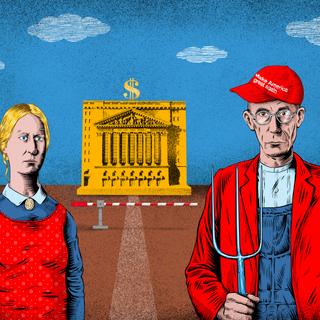


Protectionism, a political history of the US from George Washington to Donald Trump
InvestigationAgainst the opinion of economists, the president-elect intends to set high tariffs. The issue of this form of taxation has always been at the heart of American debate, and even the Founding Fathers had been divided over it.
Donald Trump sat relaxed on one buttock leaning against a railing. He was talking about the word "tariff." "The Senate and the House have to get really smart on this because, purposefully over a period of years, they've given it a bad name. Actually, I consider it one of the most beautiful things I've ever seen. The word tariff, I love it, I think it’s beautiful." That was on September 27, 2024, in Warren, Michigan, at a campaign rally. For several weeks, he would repeat his love of the word. In North Carolina, on November 3: "Outside of love and religion, it's the most beautiful word there is." Speaking to reactionary podcaster Joe Rogan on October 25: "It's more beautiful than love; it's more beautiful than anything." According to him, the right use of tariffs would bring about the country's rebirth. They would boost the industrial sector, reduce trade deficits, stop wars and even solve the problem of childcare costs.
Trump is a protectionist, but his speeches contain every possible contradiction. In the past, he has called himself a "free trader," all while extolling the need to "protect our borders from the ravages of other countries." In fact, he subscribes more to a mercantilist than to a protectionist tradition. Mercantilism is to economics what nationalism is to politics. It is about maximizing exports and minimizing imports, and thereby increasing dominance over rival powers. Formalized by the Italian philosopher Antonio Serra (1568-1620) in his 'Short Treaties' on the Wealth and Poverty of Nations in 1613, mercantilist thinking was very widespread in Europe before industrialization.
When he came to power in 2017, Trump upended economic orthodoxy, which extols the virtues of open trade, and resurrected mercantilism. Trump sees trade as a zero-sum game with losers and winners: a battle in which tariffs play both a defensive and offensive role. According to his writings on the subject, which have been fairly constant since the 1980s, the trade deficit necessarily reflects a country's weakness in relation to other nations, an idea that most economists would refute. You have a negative trade balance? You're a loser. That's why Trump rejects international trade agreements, preferring power struggles. The author of The Art of the Deal adores strong-arming bilateral relations.
You have 85.22% of this article left to read. The rest is for subscribers only.
